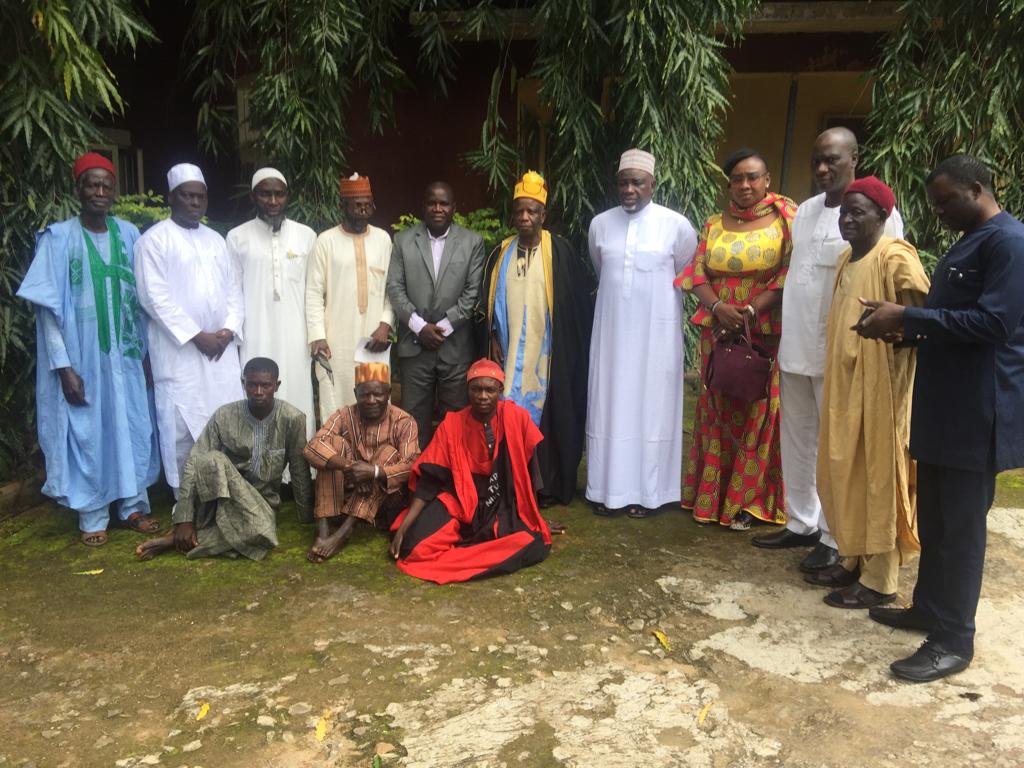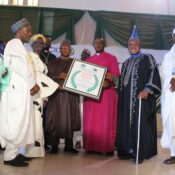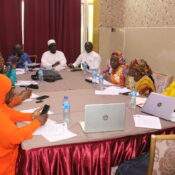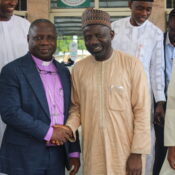
Peace Advocacy Visits to Flash Point States
The peace advocacy visits to five flashpoint states namely Benue, Plateau, Taraba, Kaduna and Zamfara were initiated by IDFP to respond to the concerns on the growing nature and scope of the conflicts in Nigeria that are gradually assuming regional, religious and ethnic dimensions. These conflicts have the potential to escalate tension and impact negatively the approaching 2019 general elections especially in the identified flashpoint states. Thus, IDFP considered it very crucial to make an intervention with the objectives to:
-
Demonstrate sympathy and show empathy to the affected conflict communities;
-
Engage conflict communities in peace and reconciliation advocacy;
-
Make findings on the profile, sources, parties, nature, dynamics, and previous interventions of the conflicts;
-
Design further intervention strategies as determined by the findings; and
-
Introduce IDFP and KAICIID to the conflict communities as well as state and local authorities.
The Advocacy visits had four major activities carried out across the five target states. These activities include;
-
Advocacy meetings with critically affected individuals and families, policy makers and implementers; as well as groups and organizational stakeholders
-
Fact finding town hall meetings with stakeholder and communities
-
Fact finding visits to affected communities
-
Sympathy and advocacy visits to IDP camps
-
Benue State
The team was led by Alh Ibrahim Yahya while Prof Peter Agogo was the Local Organizing Committee (LOC) chair. The advocacy visit took place from 19th – 23rd September, 2018. The team visited the three major tribes- the Tiv, the Idoma and the Igede. They had useful interactions with the people of both religions – Muslims and Christians, with town hall meetings in Gboko, Otukpo and Makurdi. The IDFP committee through their interaction with the various stakeholders found out that the crises were non-religious but religion was used as a tool to mobilize support or inflict injury on the other. Other issues included land disputes, destruction of farm produce and the introduction of an anti-open grazing law. In the three town hall meetings and Visits to IDP camps, 1262 participants were in attendance.
-
Zamfara State:
The advocacy visit took place from 10th to 13th September 2018 and was led by Alh Aminu Yakubu Mahmoud (Dankaden Bauchi) and the LOC chair was Fr Stephen Ojapah.
At a town hall meeting on Monday the 10th September 2018, organized by the Federal Ministry of Information; the State Governor said “the State has witnessed over 60 attacks since 2011 which according has led to the death of over 4000 people, affecting 500 towns and villages across 13 local governments in the state”. He continued by saying “this has led to the destruction of 3000 hectares of farmlands, the rustling of 25,000 cows and over 6000 people sustained different degrees of injuries.”
The advocacy committee organized town hall meetings and met with influential stakeholders in the state to understand the issues and the responses being undertaken to address the needless suffering and loss of lives. Some of the stakeholders visited included security agencies, traditional rulers, religious groups, government officials, socio-cultural associations, etc. The visit to Zamfara State reached a total of 178 direct beneficiaries.
Some of the key stakeholders specifically asked IDFP to intervene in the areas below:
-
Miyetti Allah Cattle Breeders Associations requested IDFP to come back soonest to assist in the mediation processes between them and the state government and the armed groups;
-
The commissioner of police equally asked IDFP to assist by engaging “Yan Sa Kai” (vigilante group).
-
Kaduna State:
The team was led by Alh Ishaq Kunle Sanni while the LOC chair was Imam Muhammad Sani Isah. The visit was to help address the triggers of violence in the state which usually occurs over poor relationships between the Christian and Muslim adherents. New conflict factors led to clashes between crop and livestock farmers which resulted in the destruction of property and the death of many persons.
The visit’s purpose was to hear first-hand information from the target groups and communities on the issues, challenges, and recommendations on how to address the problems. The IDFP committee visited key stakeholders such as the Commissioner of Police, and religious and traditional leaders. A town hall meeting with various stakeholders that included women, youth, community/traditional leaders, and religious leaders among several others were held to hear their perspectives on the conflict issues in the state. In total, 190 stakeholders were reached by the visiting IDFP team.
The major challenge faced by the IDFP committee was the attack on the team on their way from Kafanchan following the kidnap of the late Agwom Adara and the subsequent killings of some of his entourage and the reaction by the youth who blocked the highway to Kaduna.
Recommendations:
-
More awareness on the media for people to know where to report on issues of insecurity and the safety of human lives.
-
Capacity building program on Early Warning and Early Response for both the farmers and pastoralist
-
There should be a program on forgiveness and reconciliation on the conflict in Kasuwan Magani and its environs.
-
Continuous media programs on radio and television on the need for the citizens to imbibe the culture of peaceful coexistence should be aired.
-
Hate speeches is on the increase, there is a need for political parties, and religious and traditional leaders should convey a Summit on how to mitigate such negative utterances.
-
Taraba State:
The delegation was led by Bishop Dr. Sunday Onuoha while Elder Leah Olusiyi Solomon was the LOC chair. The team was in the state from 15th to 18th October 2018.
The team visited two IDP camps in Jalingo and donated food items and condiments. The delegation also went to Mambilla and visited the Chief of Mambila at his Palace to have a meeting with him and intimate him on the reason for the visit including IDFP’s plans to intervene in the communities affected by conflict in order to promote peace and tolerance among various beliefs. Similarly, the delegation paid advocacy visits to the Lamdo of Gashaka and Aku-Uka of Wukari, and held discussions on the need for peaceful coexistence.
Town hall meetings were held in Jalingo, Mambilla, and Wukari. Participants unanimously agreed that the only way we can preserve and protect the sanctity of human life is for people to begin to have respect and tolerance for each other. They also called on the government to treat its citizens with fairness, equity, and justice where impunity should not be entertained because of religious, ethnic, and political affiliation. The IDFP was able to reach 1357 stakeholders and IDPs in Taraba state.
Next Steps/Recommendations Taraba:
In order to respond to the crises in Taraba state;
-
IDFP should train religious leaders to teach their adherents peaceful co-existence, tolerance and to preach against hate speech
-
IDFP should support JNI and CAN to introduce interreligious platform to cement relationship.
-
Education support services are needed across Taraba state affected areas and encourage women’s participation in dialogue and peace buildings efforts.
-
Humanitarian support is needed in the state, especially in the affected areas.
-
Plateau State
The team was led by Amir Muhammad Jameel Muhammad and Rev Dr Zakka Ahuche was the LOC chair. The visit was designed to respond to the incessant violent conflicts the state has been experiencing since 2001 which has led to the loss of lives and properties. The diverse historical context of Jos has become one of the major causes of crisis across the state coupled with the recent spate of killings and destruction consequent upon the farmers and herders conflict.
The team conducted several advocacy visits to key stakeholders and actors in Plateau state who are working on the security situation in the state. During the visits, the delegation said they were in Jos on fact-finding mission to understand why the crisis has persisted and the support that IDFP can provide towards resolving the conflicts through dialogue.Some of the stakeholders visited include:
-
Commander Operation Safe Haven (OPSH)
-
The Gbong Gwom Jos and Chairman, Plateau Council of Chiefs, His Royal Majesty
-
The Department of Security Services (DSS)
-
The Commissioner of Police
-
The JNI and MACBAN
-
The IDP camp at Anguldi in Jos South local government
-
Bassa Local Government Council (LGC)
-
Bokkos LGC
-
The IDP camp in Bokkos
-
Barkin Ladi LGC
-
IDP camp at Heipang Barkin Ladi
-
IDP camp in Ban Riyom LGA
-
Riyom LGC Chairman and Gwom Rwei Riyom
The town hall meeting was held in Jos with representatives from IDP camps in the five LGAs earmarked for this fact finding mission, CSOs, security operatives etc.
Some of the speakers from the indigenous farming communities stated that herdsmen destroyed more than fifty (50) of their villages, killed many and drove out the rest of them. Their homes and farmlands are now being occupied by the herdsmen. Elder Daniel Gashish said “we lived peacefully with the Fulani and suddenly we woke up on June 23 and 24, 2018 and found ourselves being attacked. We do not want to live in IDP camps any longer. We want to return to our villages.”
The Legal Adviser to Miyetti Allah Cattle Breeders Association of Nigeria (MACBAN), Plateau State Chapter, Barr Sani Isah Mohammed, expressed deep sympathies with victims of the attack and said MACBAN “totally condemns attacks on villages” and called for improved security before the displaced people can return to their villages.
The Plateau state IDFP Advocacy team were able to reach 5212 local leaders and IDPs.
Recommendations:
-
Since all parties are willing to dialogue and are looking for a lasting solution to the crisis, IDFP should take advantage of this situation and move in as fast as possible. It is obvious that the people have faith in IDFP.
-
IDFP should seek support from KAICIID and other donor agencies to alleviate the sufferings of these people and help them with building materials so they could rebuild their homes.
-
IDFP should employ her skills in Dialogue and Mediation to restore lasting peace in the state.




